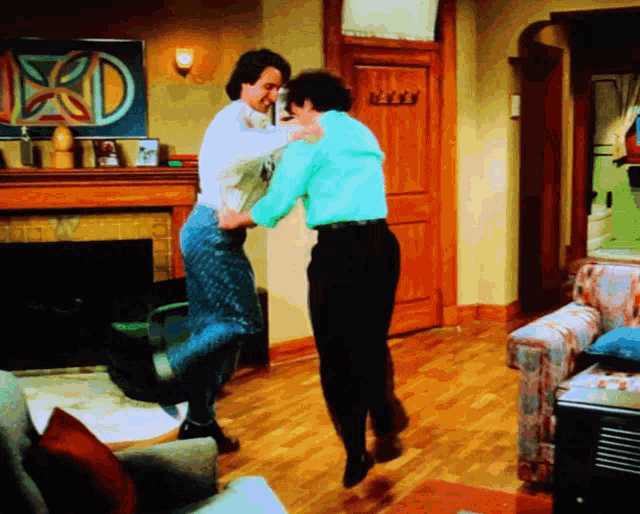MacGYVER YOUR ENTHUSIASM (16)
By:
February 24, 2025
One in a series of enthusiastic posts, contributed by 25 HILOBROW friends and regulars, analyzing and celebrating favorite TV shows from the Eighties (1984–1993). Series edited by Josh Glenn.

PERFECT STRANGERS | 1986–1993
In Trump’s America, where immigrants are demonized as violent, cat-eating criminals and Nuremberg-esque crowds chant “mass deportation,” it’s hard to remember that the United States once prided itself on welcoming the huddled masses. Although xenophobia has always been strong, Americans seemed to respect the immigrant work ethic — if you made it to these teeming shores, worked hard and assimilated, you too could be part of the great American melting pot. So it’s surprising that the history of American TV features so few sitcoms devoted to immigrants.
You’ll see the occasional kooky-but-lovable foreigner in a supporting role — Ricky Ricardo in I Love Lucy, Latka Gravas in Taxi — but aside from Eva Gabor in Green Acres, Robin Williams in Mork & Mindy, and the furry titular lead of ALF, there are few shows about immigrants. As the ultimate fish-out-of-water story, Mork & Mindy set the template that Perfect Strangers copied, thematically and literally. It’s no coincidence that Dale McRaven created both shows.
Perfect Strangers, which debuted in 1986, stars Bronson Pinchot as Balki Bartokomous, a humble shepherd who lands on the Chicago doorstep of his distant cousin, Larry Appleton (Mark Linn-Baker). Hailing from the fictional southeastern Mediterranean nation of Mypos (the Greek word for “maybe”), Balki has an endless supply of colorful vests and cultural malapropisms. Potato chips are “potato crumbs.” A nervous breakdown is a “nervous breakdance.” He doesn’t throw in the towel, he “throws up the towel.” Best not to wonder why a greenhorn (the show’s original title) who’s gobsmacked by color TVs and pop tops on soda cans has a repertoire of cultural riffs from Tippi Hedren to Tina Turner. Larry, who has also left his homeland (a large family in a small Wisconsin town), is high-strung, neurotic, and controlling. Together, these two strangers in a strange land present a classic, odd couple battle of ego and id. Where Balki is impulsive, freewheeling, and eager for new experiences, Larry is moralizing, scoldy, and so uptight he often wears a necktie at home. Without one another, they are incomplete. Only together can they successfully meet life’s challenges.
As a child, Perfect Strangers was a revelation. It was the only TV show that offered even the flimsiest representation of my family’s immigrant experience. While my parents were engineers not shepherds, they knew the challenges of uprooting themselves and their child. They knew how hard it was to learn a new language, to adapt to a foreign culture. They knew what it was to leave behind people they loved and would never see again. I still remember when my father would bellow, “Now, we are so happy, we do the Dance of Joy,” as he held me in his arms and danced around the room, imitating Balki’s Myposian ritual.
Pinchot and Linn-Baker had chemistry. For the first three or four seasons, the show’s writers had fun hurtling them into absurd situations — battling gushing pipes, escaping a biker bar, being handcuffed to each other, going on a supermarket shopping spree. The actors mugged for the camera and sold the slapstick. Complete with catchphrases and a bombastic theme song (see season four of Only Murders In The Building), it was a pillar of ABC’s TGIF lineup, spinning off another hit sitcom, Family Matters. As Balki and Larry got better jobs, a better pad, and girlfriends who ultimately became wives, the producers pissed away the show’s promise. In 1993, after eight seasons, it limped out with one of the dumbest finales (childbirth! hot air balloon!) of any show ever broadcast.
Perfect Strangers achieved a nifty trick. It gave Americans a chance to chuckle at cultural differences without ever critiquing our unearned sense of cultural superiority or questioning our notions of national identity. On rewatch, I’m struck by how charming I find this naivety. In 2024, the idea that we could cheerfully live alongside people of different races and from different places seems so absurd, it would make Balki himself invoke his favorite phrase, “Don’t be ridiculous!”
MacGYVER YOUR ENTHUSIASM: INTRODUCTION by Josh Glenn | Michael Grasso on MAX HEADROOM | Heather Quinlan on MYSTERY SCIENCE THEATER 3000 | Mark Kingwell on CHINA BEACH | Judith Zissman on SANTA BARBARA | Adelina Vaca on TEENAGE MUTANT NINJA TURTLES | Deborah Wassertzug on MOONLIGHTING | Josh Glenn on VOLTRON | Adam McGovern on A VERY BRITISH COUP | Alex Brook Lynn on STAR TREK: THE NEXT GENERATION | Nikhil Singh on CHOCKY | Sara Ryan on REMINGTON STEELE | Vanessa Berry on THE YOUNG ONES | Dan Reines on GET A LIFE | Susannah Breslin on PEE-WEE’S PLAYHOUSE | Marc Weidenbaum on LIQUID TELEVISION | Elina Shatkin on PERFECT STRANGERS | Lynn Peril on THE SIMPSONS | David Smay on THE DAYS AND NIGHTS OF MOLLY DODD | Annie Nocenti on THE SINGING DETECTIVE | Tom Nealon on MIAMI VICE | Anthony Miller on ST. ELSEWHERE | Gordon Dahlquist on BLACKADDER | Peggy Nelson on SEINFELD | Nicholas Rombes on TWIN PEAKS | Ramona Lyons on ÆON FLUX
JACK KIRBY PANELS | CAPTAIN KIRK SCENES | OLD-SCHOOL HIP HOP | TYPEFACES | NEW WAVE | SQUADS | PUNK | NEO-NOIR MOVIES | COMICS | SCI-FI MOVIES | SIDEKICKS | CARTOONS | TV DEATHS | COUNTRY | PROTO-PUNK | METAL | & more enthusiasms!
